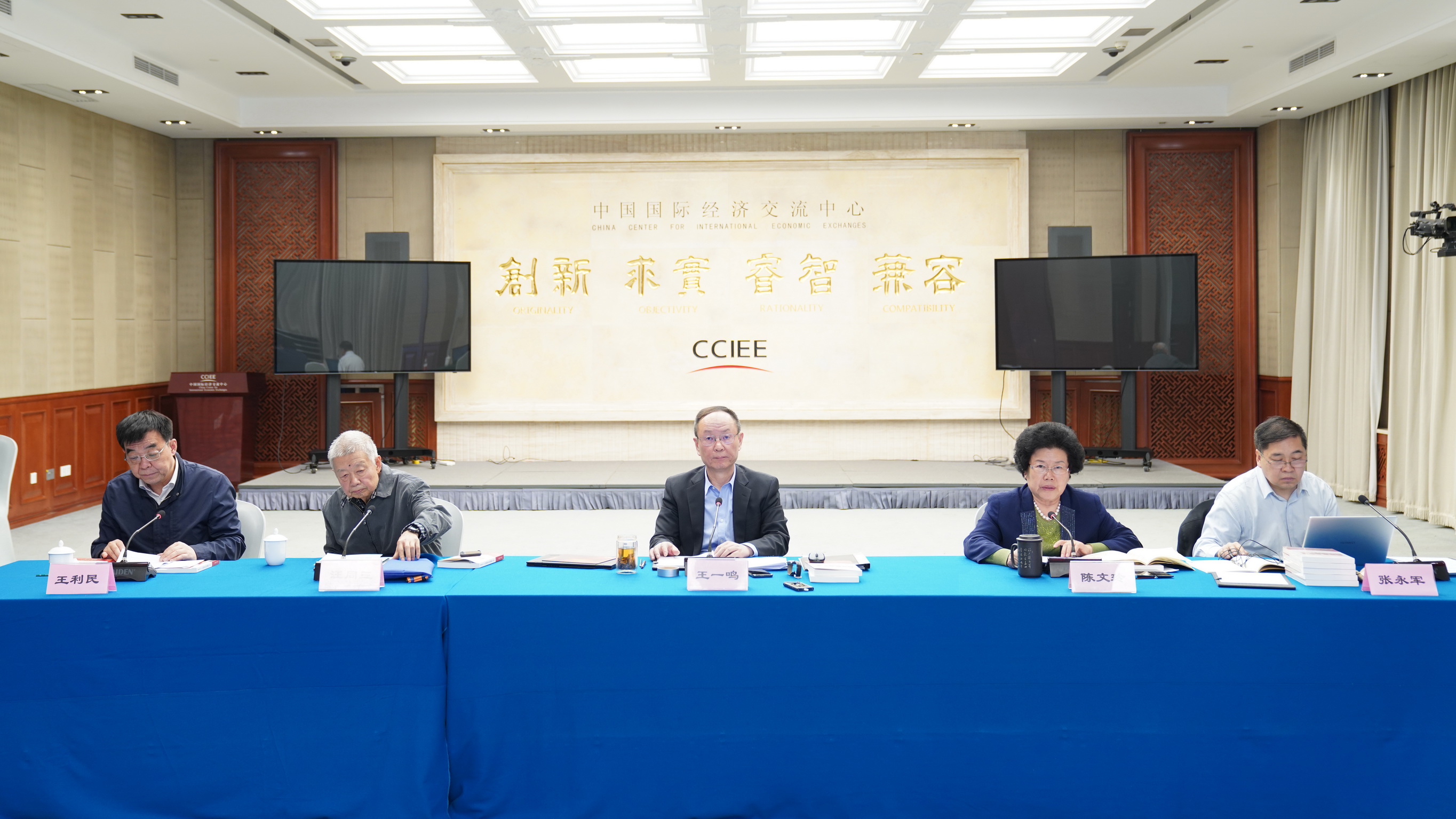Analysis on China’s and World Economy and the Releasing Ceremony of Economic Observations from China’s Think Tanks’ Perspective (2020)-CCIEE Hosts the 145th “Monthly Economic Talk”
- Time:2021-11-04
- source:CCIEE
On 29 October 2021, China Center for International Economic Exchanges (CCIEE) held the 145th “Monthly Economic Talk” and the releasing ceremony of Economic Observations from China’s Think Tanks’ Perspective (2020) through virtual approach. Chaired by Wang Yiming, Vice Chairman and Chairman of Academic Committee of CCIEE, the videoconference launched the new book during the first session and discussion themed with “Chinese and World Economy” during the second. Wang Tongsan, Member of the Chinese Academy of Social Sciences (CASS) and Former President of Institute of Quantitative and Technological Economics, CASS, Chen Wenling, Chief Economist and Deputy Director of Executive Board of CCIEE, Wang Limin, President of Social Science Academic Press and Zhang Yongjun, Deputy Chief Economist of CCIEE, attended the two sessions and delivered speeches respectively.

During the first session, Wang Limin, Zhang Yongjun and Wang Tongxian introduced and commented the publication and major content of the book. They agreed that Economic Observations from China’s Think Tanks’ Perspective, which selects and compiles key opinions of guest speakers attending Annual Conference on China’s Economy and Monthly Economic Talk as well as research reports on hotspot economic issues by experts of CCIEE, peers into issues facing China’s economy and provides solutions from the perspective of think tank, bridging the economic thoughts and real actions. So far, there have been 12 volumes of the book published while the issues with most attention in 2020 include but not limited to impact of the COVID-19 pandemic on domestic and overseas economy, China-U.S. major-power relations and world economy, understanding of “Two Sessions of NPC and CPPCC” spirit, new development paradigm and implementation of new development concepts.
During the discussion of second session, Wang Santong viewed that although uncertainty in global economy has increased, there are five advantages in China’s economic development. First, China’s economy has sound and stable foundation, with its GDP volume accounting for 17% of the world total. Second, China has a complete system of three industries, serving as good foundation for new development paradigm. Third, as a world-class consumer, China has provided the world with sufficient room to cushion the negative impact of the COVID-19 pandemic. Fourth, adequate investment in research and development and most patent applications worldwide create favorable conditions for technological innovation. Last but not least, the export of China increased against the background of the pandemic, injecting impetus to world trade. In the meantime, China should also effectively respond to pressure from the U.S., address increasingly prominent problem of aging society with a low birth rate in a gradual manner, and predict and prevent energy and food issues concerning national security. Efforts should be taken to balance social fairness and efficiency, and relations between economic development and resources and environment. Besides, China should increase residential incomes while continuing to encourage investment and consumption, dealing with income distribution issue effectively.
Chen Wenling pointed out that global economy faces eight changes and risks. First is the risk that economic activities will be blocked, separated and cut off due to the pandemic. Second is the uncertainty, imbalance and instability in growth of world economy. Next is that world economy would undergo inflation and deflation alternatively as adjustment is going to be made for easing currency policies. Fourth is the looming debt and financial risk resulting from a nearly 300 trillion U.S. dollars of total global debt. Then comes to the severe impact on global logistics. Sixth is the increasing financial risk worldwide, followed by sudden influence to world economy brought by extreme climate. Last but not least, easing currency policies with excessive fluidity and limited production in some countries lead to greater energy risk all around the world. China should adjust policies and adapt to the changes proactively in the future on the basis of balancing stable growth and risk prevention.
Zhang Yongjun said that the economic recovery of different countries is far from expectation due to resurgence of the pandemic worldwide. Both the consumption and investment have decreased moderately in China, with possibly weakened role of export to drive up economic growth. The influence of increased industrial Producer Price Index (PPI) has gradually spread to Consumer Price Index (CPI) while prices of rigid-demand commodities like crude oil have soared up and medium-sized, small and micro enterprises faces risks in stable operation. China should actively adopt macro policies that are more targeted, mitigating negative impact of downward economy on medium-sized, small and micro enterprises. Meanwhile, China should expand domestic demand in a proactive manner to make up weakened stimulation of export on economic growth, so as to maintain a stable growth of China’s economic growth.
After the speeches, experts present interacted and communicated with the media. Some research fellows of CCIEE and audience from member organizations of CCIEE, research institutes, enterprises and the media took part in the Talk through virtual approach.
